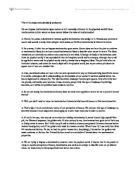In your opinion, should an atheist who does not believe in God or the afterlife follow the same moral rules as a Christian who does believe in these things?
In your opinion, should an atheist who does not believe in God or the afterlife follow the same moral rules as a Christian who does believe in these things?
The End Does Not Justify the Means
I believe that an atheist should have a set of moral rules to live by, but those should not be the same rules that a Christian follows. Though the rules themselves may be similar for either type of person, I believe that the reasons or motives that govern a person to act the way he or she does discerns one moral code from another. The Divine Command Theory must be false in order for an atheist to live morally. The drive behind “right” or “wrong” actions justify whether the end result is a morally correct action or even livelihood.
Just as the Euthyphro Argument asserts that if God lacks reasons for his commands they become arbitrary, then by the same logic a person following principles solely because they are set down by their religion is doing so blindly; they abide by the rules only because they are “established” doctrines. The rationale behind why these rules are put into place is ignored and thus the usefulness of having these rules is overlooked. According to this argument, if God had no factors or justifications as to why something is good or why something is bad, then these rules could be seen as random. A God that makes rules randomly is not a perfect presence, but if God uses some sort of reasoning to determine right from wrong then it is implied that a set of morals preexisted God. Therefore God himself did not create this moral rubric, and simply acknowledges it.








